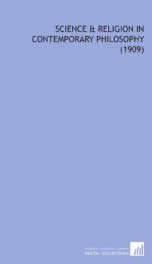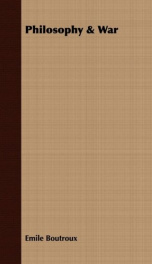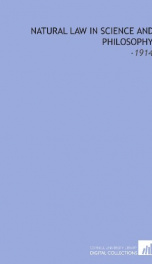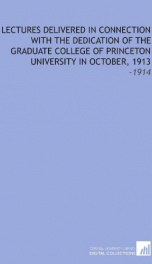the contingency of the laws of nature

Purchase of this book includes free trial access to www.million-books.com where you can read more than a million books for free. This is an OCR edition with typos. Excerpt from book: CONCLUSION When man, in ancient Greece, became conscious of himself and reflected on his condition, he believed himself the sport of an external, impenetrable, and irresistible power, which he called destiny. In accordance with this belief, it was his duty to obey mysterious orders, and he was condemned to expiate inevitable crimes. After bewailing his servitude, he found courage to pronounce judgment upon this inflexible power, finding it cruel and iniquitous, and regarding himself as superior to it. He was astonished that he had submitted to this shameful yoke without examining it. He attempted to escape from and break it: and he did break it. No longer did the world dictate laws to him; he dictated laws to the world. He became aware of his freedom. Soon, however, there arose within him fresh ground for uneasiness. In order to be free in reality, was it sufficient that he should be free as regards, the external world ? Did he not feel within himself impetuous stirrings, irresistible forces, analogous to that destiny in which he had formerly believed ? Was he then mistaken only as to where this sovereign power had its abode ? Though outside of the world, did it dwell within himself? Was he the slave of his passions, his ideas, and his nature ? Was fatality gripping him again, just when he thought he was escaping from it ? Undoubtedly, this new fatality was not so brutal and stupid as the former; all the same, was it less absolute ? Is a chain any the lighter from not being perceived by the outer world ? Under the sway of this outer world, there was one liberty man still retained : that of protesting inwardly against the violence of which he was the victim. Beneath the sway of his own nature, to believe himself free was to be his own dupe. What value does dominion over th...
Info about the book
Author:
Series:
Unknown
ASIN:
B005HFSK8M
Rating:
3/5 (4)Your rating:
0/5
Languge:
English
Users who have this book
Users who want this book
What readers are saying
What do you think? Write your own comment on this book!
write a commentGenre
if you like the contingency of the laws of nature try:
Do you want to exchange books? It’s EASY!
Get registered and find other users who want to give their favourite books to good hands!









